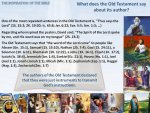T
but then God corrected your assumptions and informed you that he was only a day old, would you then turn around and call God a "lying", "trickster"?
I don't believe God can be "wrong."
If a person is purposely trying to fool me into thinking that what I was looking at was something else, then yes, that person would be a liar and a trickster.
I don't believe God is a liar or a trickster.
If I am looking at a duck, and it passes all the tests to be a duck -- it quacks like a duck, it waddles like a duck, it has the exact right DNA to be a duck, etc. -- and someone tells me it's not a duck, then yes, that person is not literally correct.
I then have to think about the person who's talking to me. Is he or she stupid, and doesn't know what a duck is? Or is he or she purposely trying to deceive me? Or maybe he or she is making some sort of poetic statement about ducks, like "This isn't just a duck you see, it represents all waterfowl." I have to look at the person I'm talking to and make an assessment about which is most likely. I don't reject what my senses tell me, that this is a duck. I question why the person is telling me otherwise.
More often than not, when a statement contradicts what your senses tell you, it's not your senses that are wrong, OR that the person making the statement is wrong, but that your have misunderstood the statement.
The very first time I read Genesis 1:1-2:4a, it was very clear to me that it was not intended to be taken literally. It was clearly intended as a story. A wonderful, fabulous story, written by God, the greatest author there is. This story is far better, far more important, far superior than any factoid any scientist can tell me about evolution or the big bang. Sure, I accept both evolution and big bang, but neither one can hold a candle to any of God's story of creation, as told in the Bible.
You keep thinking that referring to Scripture as myth is somehow "demeaning" or "insulting." That is absolutely false. If anything, the opposite is true: the more mythic, the more symbolic something is, the more "true" it is. God's creation story is not literally accurate, but that doesn't mean it isn't "real." It's more real than 2+2=4. It's so real, that historical and biological data can't possibly contain all the truth there is, so God had to reveal it to us as a myth, rather than as a history lesson or a biology text book.
Once you accept that truth is bigger than facts, you'll see that Jesus is there, not just at one point in history, but beyond time, transcendent of human experience.

